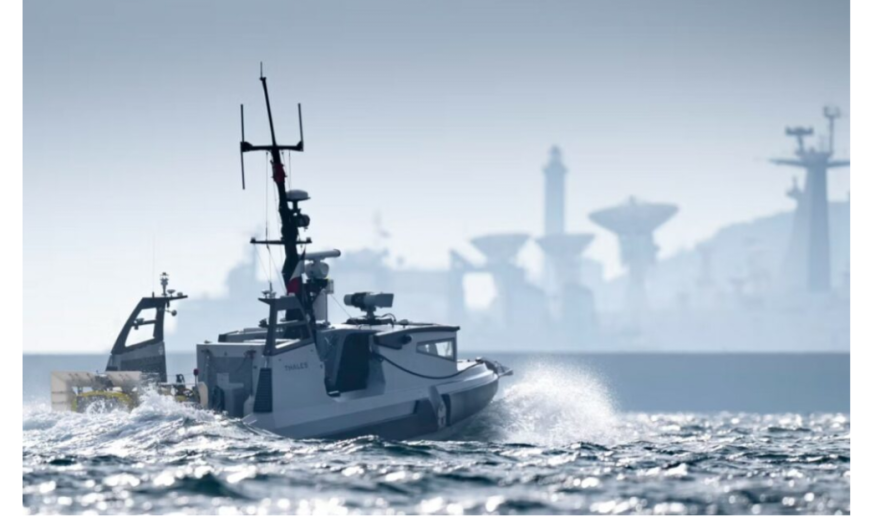As informed, the trials took place as part of the Anglo-French Maritime Mine Counter Measures (MMCM) programme which, is delivering autonomous capability for both the Royal Navy and the French Navy.
June 14, 2023.. A significant step towards autonomous mine-hunting operations has been achieved after Royal Navy Motor Boat (RNMB) Apollo, an Uncrewed Surface Vessel (USV) delivered by Thales, completed a demanding series of Royal Navy and industry open water assurance trials.
RNMB Apollo has successfully completed tests that prove remotely controlled uncrewed vessels can be operated by a team at a shore-based control station, completing a series of tasks, while retaining awareness of its course and position utilising line of sight communications systems.
UK Ministry of Defence revealed that the trials were run in December 2022 by the Royal Navy Maritime Autonomous System Trials Team (MASTT).
The delivery of uncrewed mine clearance platforms will allow the Royal Navy (RN) to continue their important role of keeping shipping lanes open without putting sailors or crewed platforms into the threat area.
Fitted with a powerful combination of sensors, including radar, LIDAR (light detection and ranging) and electro-optical and infra-red cameras, the vessel’s position was continuously relayed to the command and control centre over a secure communications network.
This connection enabled the command and control software to merge the sensor inputs into a single (Coherent) tactical picture using Thales MCube mission management software. It also allows detection and tracking of other vessels and to take appropriate actions, including remotely controlled avoidance manoeuvres.
In service, these vessels will be capable of operating in national waters or being air-transported quickly across the world to hunt for mines in danger zones or secure sea lines of communications, while demonstrating high rates of reliability, autonomy and cybersecurity. They can be deployed and operated from ship and shore bases providing configurable and performant capability.
RNMB Apollo is one of the two pre-production Uncrewed Surface Vessels delivered to the Royal Navy and French Navy in December 2021 as part of the joint UK-France Maritime Mine Counter Measures (MMCM) programme which will bring autonomous mine hunting capability to the two fleets.
With stage two of the contract now in the production phase, Thales is working to deliver full operating capability to both countries in 2024.
Called the Royal Navy Motor Boat (RNMB) “Apollo,” the diminutive vessel is being developed to provide the navy with a partially autonomous, remotely controlled, mine sweeper. The trials, which have only been officially made public, were part of the Anglo-French Maritime Mine Counter Measures (MMCM) program, which delivers the autonomous capability for the Royal Navy and the Marine Nationale (French Navy).
“Apollo” is outfitted with various sensors, such as radar, LIDAR, and electro-optical and infrared cameras. These sensors enable the vessel’s location to be constantly communicated to the command and control center via a secure communication network throughout the trials.
These vessels are designed to operate in national waters or be transported by air to dangerous zones worldwide to hunt for mines or secure sea lines of communication. One of the two pre-production Uncrewed Surface Vessels (USV), RNMB “Apollo,” was delivered to the Royal Navy and Marine Nationale in December 2021 as part of the MMCM program. The program aims to bring autonomous mine-hunting capability to both fleets.
“We have a long tradition of supporting the Royal Navy and Marine Nationale in mine warfare, surface ship and underwater operations, and we are very proud to be working with them both to bring these game-changing autonomous systems into operational service,” said Gwendoline Blandin-Roger, managing director of underwater Systems, Thales.

